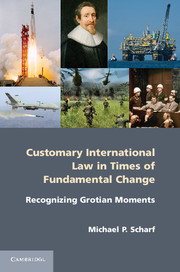Book contents
- Frontmatter
- Contents
- Author’s Biography
- Acknowledgments
- 1 Introduction
- 2 Historical Context
- 3 Theoretical Underpinnings
- 4 Nuremberg
- 5 The Truman Proclamation on the Continental Shelf
- 6 Outer Space Law
- 7 The Yugoslavia Tribunal’s Tadic Decision
- 8 The 1999 NATO Intervention
- 9 The Response to 9/11
- 10 Conclusion
- Index
- References
1 - Introduction
Published online by Cambridge University Press: 05 June 2013
- Frontmatter
- Contents
- Author’s Biography
- Acknowledgments
- 1 Introduction
- 2 Historical Context
- 3 Theoretical Underpinnings
- 4 Nuremberg
- 5 The Truman Proclamation on the Continental Shelf
- 6 Outer Space Law
- 7 The Yugoslavia Tribunal’s Tadic Decision
- 8 The 1999 NATO Intervention
- 9 The Response to 9/11
- 10 Conclusion
- Index
- References
Summary
This book examines the concept of “Grotian Moments,” a term that denotes radical developments in which new rules and doctrines of customary international law emerge with unusual rapidity and acceptance. Though I am an academician, my interest in this concept did not begin as purely academic. During a sabbatical in the fall of 2008, I had the unique experience of serving as Special Assistant to the International Prosecutor of the Extraordinary Chambers in the Courts of Cambodia (ECCC), the tribunal created by the United Nations and government of Cambodia to prosecute the former leaders of the Khmer Rouge for the atrocities committed during their reign of terror (1975–9). While in Phnom Penh, my most important assignment was to draft the Prosecutor’s brief in reply to the Defense Motion to Exclude “Joint Criminal Enterprise” (JCE) liability as a mode of liability from the trial of the five surviving leaders of the Khmer Rouge.
JCE is a form of liability somewhat similar to the Anglo-American “felony murder rule,” in which a person who willingly participates in a criminal enterprise can be held criminally responsible for the reasonably foreseeable acts of other members of the criminal enterprise even if those acts were not part of the plan. Although few countries around the world apply principles of coperpetration similar to the felony murder rule or JCE, since the decision of the Appeals Chamber of the International Criminal Tribunal for the Former Yugoslavia in the 1998 Tadic case, it has been accepted that JCE is a mode of liability applicable to international criminal trials. Dozens of cases before the Yugoslavia Tribunal, the International Criminal Tribunal for Rwanda, the Special Court for Sierra Leone, the Special Panels for the Trial of Serious Crimes in East Timor, and the Special Tribunal for Lebanon have recognized and applied JCE liability during the last ten years.
- Type
- Chapter
- Information
- Customary International Law in Times of Fundamental ChangeRecognizing Grotian Moments, pp. 1 - 12Publisher: Cambridge University PressPrint publication year: 2013
References
- 1
- Cited by



